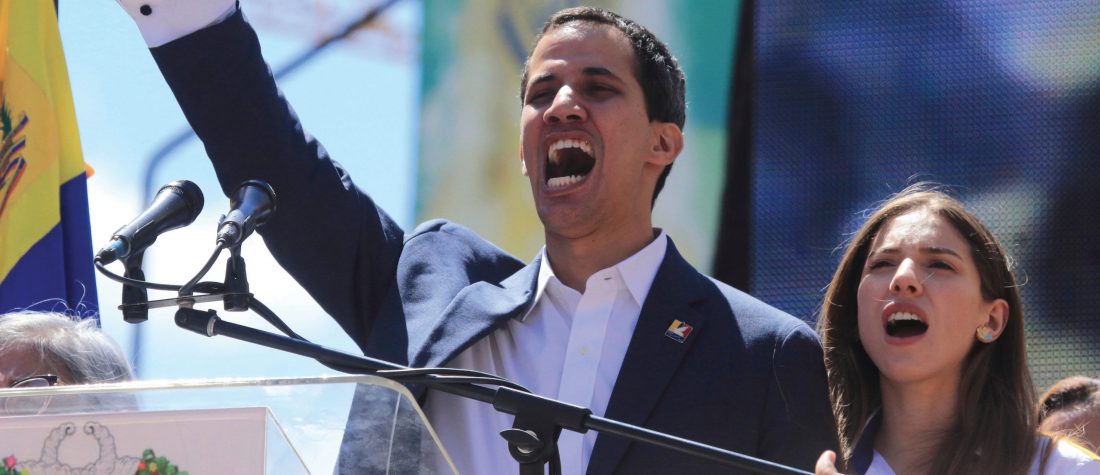I signed up for diplomacy, but got politics and – honestly speaking – insurgency. I’m London’s insurgent diplomat. That’s not at all a complaint. I have always loved a good fight, particularly when I feel I’m on the right side of history, and on this I certainly am: as the representative for the interim President of Venezuela Juan Guaidó to the United Kingdom and Ireland, my mission is to bring both my host countries on board as reliable allies of the Venezuelan people, defending them from the predations of the Nicolás Maduro dictatorship. It’s a far cry from the more prosaic ambassadorial duties of promoting tourism, foreign investment or improving trade terms. I also have none of the bells and whistles of London ambassadors, not even a salary. As the New Year’s drinks party with the foreign secretary at Lancaster House wound down and my colleagues hopped into the back of their chauffeur-driven black Mercedes, I walked to Green Park tube. That’s likely one of the reasons the Financial Times calls me “London’s most unconventional diplomat”.
My days are spent doing a whole lot more media than probably the rest of London’s diplomatic corps combined. In English, Spanish, sometimes French and Arabic, from major television and radio broadcasting to YouTube and Instagram Live influencers, blogs to global newspapers – it all goes into the broader daily mix to win hearts and minds in the constituencies of the decision makers who can help me get the dictator on a plane out and our people back to democracy and prosperity. I also need to routinely address our own people, move hearts and minds in Caracas, and that is challenging after 20 years of dictatorship that have destroyed all institutions (including a free press) and overseen the greatest kleptocracy in history: we estimate somewhere between $300bn and $450bn have been siphoned off by our political class and their enchufados, the politically “plugged in”.
The convergence of all that means I am facing a home audience that does not understand the role of diplomats and is deeply suspicious of anyone with political affiliations – yes, including my boss Juan Guaidó. So I have to constantly communicate with the diaspora here and the audience back home. The diaspora in the UK and Ireland reach us through our website (venembuki.com) and Facebook page, while Venezuelans in our major cities will track Instagram and especially Twitter: foreign correspondents call it “Twitterzuela”.
More and more, though, our people are isolated; without gasoline, they cannot drive or get food to the supermarkets nor even get an ambulance to come for them; the paucity of electricity and telecommunications pose challenges even for the British embassy in Caracas, never mind families in the interior of the country. The only way to reach those deeper in Venezuela is by making two-minute videos on my phone and sending them to disseminators of WhatsApp groups across the country. If that sounds silly, it isn’t: it’s the new way of Latin American politics, and it’s how Jair Bolsonaro won the Brazilian presidency, by speaking directly to the people on WhatsApp, without the intercession of media or pundits. Even when Maduro is gone, this mechanism of political communication will not abate.
Venezuelans consider me a hardliner; within our broader Guaidó interim administration, I’m the maverick in the system: I come not from any of the political parties, but from a background in academia, business, and security. I started as a political philosophy professor, then founded my security and political consultancy firm Asymmetrica, and then chronicled my adventures in combating corruption and smuggling in my 2017 book Blood Profits.
I have already started writing my next book about my adventures in London. It has the working title Winning Gold, an unsubtle reference to the historic battle in the British courts for control of Venezuela’s 31 tonnes of gold bullion in the vaults of the Bank of England. I won’t feign modesty; I am and will always be deeply proud of my leading role in this institutional version of Money Heist’s second season, taking the £1.7bn in gold away from the brutal torturer Maduro and his Iranian and Russian backers, and turning it over to safekeeping for the Venezuelan people. With our win, we set a precedent for all who strive for freedom; it will be the mechanism to defund your dictator: if you steal elections and cling to the presidential palace, you cannot also steal what rightfully belongs to the people and their economic future. It also means that I am the only Venezuelan to have directly challenged Maduro and won. Others may have opinions, but I have a proven track record.
As I look to the end of my London tenure, I consider what I might do next. Like all civil servants, only half the decision is in my hands. I could be called upon to serve in Caracas or get a new boss who I decide I don’t want to serve. In the latter case, I will return to my company Asymmetrica and swiftly grow it. I have vowed numerous times that I will fight for my country until I draw my last breath, but I have already planned for beyond that: if I return to the private sector, I will support the emergent NGO Funda Viva that promotes the good governance that a new Venezuela will need, and I have started the process of adopting a Venezuelan refugee child, one of the 5.7 million people who have fled Maduro’s horror, a refugee crisis second only to Syria’s. Soon, as I look across the breakfast table I will see in his or her eyes the pain of displacement and a reason to keep fighting for a better future. Viva Venezuela libre!


